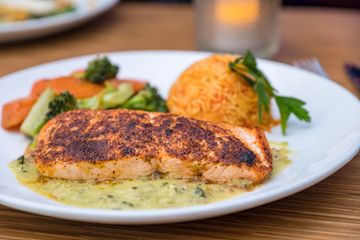Delight in freshly prepared lunch and dinner options rooted in Mexico
Is Mexican Food Healthy? Unloading the Nutritional Perks of Conventional Active Ingredients
The question of whether Mexican food is healthy invites an exploration of its typical ingredients. Beans and corn act as foundational staples, rich in healthy protein and fiber. Avocados give advantageous fats, while different natural herbs and flavors add flavor and health and wellness benefits - hand crafted margarita. With each other, these parts create a tapestry of nourishment. The healthfulness of Mexican cuisine often depends on prep work methods and section sizes. What duty do these elements play in identifying its general nutritional worth?
The Power of Beans: Healthy Protein and Fiber-Rich Staples
Commonly ignored, beans offer as a cornerstone of Mexican food, using a riches of dietary benefits. Rich in healthy protein, they are an excellent plant-based option for those looking for to satisfy their dietary healthy protein requires. This high protein material sustains muscular tissue repair service and development, making beans very useful for both meat-eaters and vegetarians alike. Furthermore, beans are an exceptional source of nutritional fiber, which assists in digestion and promotes a sensation of fullness, potentially aiding with weight management.
The selection of beans used in Mexican dishes, such as black beans, pinto beans, and kidney beans, adds to a diverse flavor account and can improve meals nutritionally. Additionally, beans are reduced in fat and include important nutrients, consisting of folate, iron, and magnesium. With each other, these attributes make beans a crucial active ingredient, providing both nutrients and food in conventional Mexican fare.

Corn: a Versatile Grain With Nutritional Advantages
Corn stands out as a versatile grain fundamental to Mexican cuisine, commemorated not just for its culinary applications but additionally for its impressive dietary profile. As a key active ingredient in meals like tortillas, tamales, and pozole, corn provides vital nutrients that contribute to a balanced diet plan. Rich in carbohydrates, it offers as a considerable power source, while additionally being reduced in fat, making it a positive option for different nutritional demands.
Furthermore, corn is an excellent resource of nutritional fiber, which helps in food digestion and advertises satiety. It contains considerable quantities of vitamins such as B-complex vitamins, which are essential for energy metabolic process. The presence of antioxidants, especially carotenoids, adds to total health by decreasing oxidative anxiety. Additionally, corn is gluten-free, dealing with those with gluten sensitivities. Generally, the dietary advantages of corn emphasize its relevance in traditional Mexican food and its duty in a healthy diet.
Avocados: Healthy And Balanced Fats and Nutrients in Every Bite
Avocados play a substantial duty in Mexican food, enhancing recipes with their creamy texture and abundant taste. Past their cooking charm, avocados are commemorated for their outstanding nutritional profile. They are an abundant resource of healthy and balanced monounsaturated fats, which can assist lower poor cholesterol degrees and support heart health. Additionally, avocados are packed with vital nutrients, including potassium, vitamin E, and B vitamins, adding to overall wellness.
The high fiber content in avocados help food digestion and advertises satiety, making them a beneficial addition to any kind of dish. Their one-of-a-kind nutrient composition can likewise sustain skin wellness and give anti-inflammatory advantages. Incorporating avocados into conventional Mexican meals or enjoying them as a standalone treat can boost both taste and nutrition, showing why they are a cherished staple in Mexican cuisine. On the whole, avocados supply a tasty method visit site to delight in healthy fats and critical nutrients in every bite.

Spices and Natural Herbs: Flavorful Health Boosters
While enjoying the rich tastes of Mexican cuisine, one can not ignore the necessary function that spices and natural herbs play in improving both preference and wellness. Ingredients such as chili, oregano, and cilantro peppers not only add to the lively taste profile yet likewise give significant wellness advantages. For circumstances, cilantro is recognized for its detoxing properties, aiding to get rid of hefty metals from the body, while oregano is packed with anti-oxidants and has anti-inflammatory results.
Chili peppers, a staple in many Mexican dishes, have capsaicin, which has been linked to enhanced metabolic rate and pain relief. Furthermore, flavors like cumin and coriander assistance food digestion and may help in blood glucose policy. Integrating these tasty health boosters right into meals not only enhances the culinary experience but likewise advertises overall well-being, making Mexican cuisine not just delicious, but also nutritionally beneficial.
Traditional Cooking Methods: Enhancing Nutrition and Taste
Standard cooking methods in Mexican food play a crucial duty in improving both nutrition and flavor, as they often focus on time-honored techniques and fresh active ingredients. Methods such as nixtamalization, where corn is soaked and prepared in an alkaline option, not only boost the nutrient account of tortillas but additionally improve their digestibility - take out and delivery. Furthermore, the use of slow-moving food preparation methods, like cooking or braising, allows tastes to combine beautifully while retaining the stability of see page the ingredients

Regularly Asked Concerns
Are Mexican Food Portions Normally Larger Than Other Cuisines?
Mexican food portions are usually bigger than those of many various other foods. This characteristic reflects typical dining techniques, highlighting public sharing and hearty dishes, which can lead to a more considerable serving size overall.
Just how Does the Prep Work Method Affect Healthfulness of Mexican Food?
Preparation methods greatly affect the healthiness of Mexican food. Strategies such as grilling or steaming maintain nutrients, while frying can enhance harmful fat content. Selections of components and cooking designs eventually determine general dietary value.
Can Mexican Food Be Customized for Certain Dietary Restrictions?
Mexican food can undoubtedly be tailored for certain nutritional limitations. Replacements, such as using corn tortillas for gluten-free diet regimens or including more veggies, enable individuals to appreciate conventional tastes while accommodating different nutritional requirements.
What Prevail Misconceptions Regarding Mexican Food and Wellness?
Typical false impressions about Mexican food include the idea that it is naturally unhealthy, excessively zesty, and solely concentrated on fats. In truth, typical dishes often include healthy ingredients and can be tailored to different dietary needs.
Are There Healthier Choices at Mexican Dining Establishments?
Much healthier options at Mexican restaurants commonly consist of grilled meats, beans, and fresh vegetables. Choosing recipes that emphasize whole components and avoiding hefty sauces can bring about a more nutritious eating experience, advertising total wellness.
The his response range of beans made use of in Mexican meals, such as black beans, pinto beans, and kidney beans, adds to a diverse flavor profile and can enhance meals nutritionally. Avocados play a considerable role in Mexican food, matching recipes with their luscious structure and rich flavor. Including avocados into conventional Mexican dishes or enjoying them as a standalone treat can boost both flavor and nourishment, showing why they are a precious staple in Mexican food. While taking pleasure in the abundant tastes of Mexican food, one can not forget the essential duty that spices and herbs play in enhancing both taste and health. Typical cooking approaches in Mexican food play an essential duty in improving both nourishment and taste, as they usually focus on fresh active ingredients and classic methods.